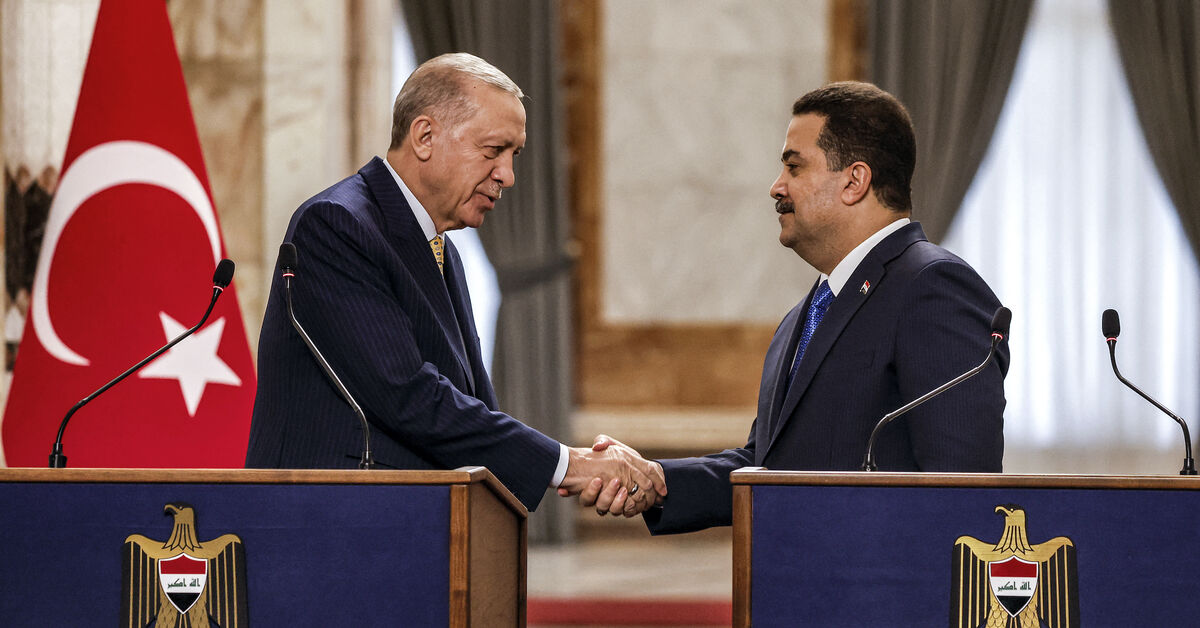Iraq’s PM says Baghdad mediating potential Syria-Turkey reconciliation
ANKARA — Iraqi Prime Minister Mohammed Shia al-Sudani said his government was working on reconciliation between Ankara and Damascus in an interview released on Friday.
“God willing, we will see some steps in this regard soon,” Sudani told Turkey’s private Haberturk TV via a translator, adding that he was in contact with Syrian President Bashar al-Assad as well as Turkish President Recep Tayyip Erdogan for the reconciliation efforts.
Turkey has been backing armed Syrian opposition groups that are fighting to oust Assad’s government since the start of the Syrian civil war, but Erdogan publicly announced in 2022 that ousting Assad was no longer his government’s agenda in Syria. The first high-level direct talks between the two capitals, brokered by Russia the same year, failed to reach any breakthrough.
Recalling his country’s role in the normalization deal between Tehran and Riyadh, Sudani said, “We are trying to reach a similar basis for reconciliation and dialogue between Syria and Turkey.” Iraq hosted a series of talks between Iran and Saudi Arabia ahead of the China-brokered landmark deal to resume diplomatic relations between the two regional powers in 2023.
Sudani became the first Iraqi prime minister to visit Damascus in 13 years last July after assuming office in 2022. His remarks on Friday come after Erdogan’s visit to Baghdad last month, also marking the first of its kind in more than a decade. Earlier this month, the Iraqi premier held security talks with Syria’s interior minister, Muhammad al-Rahmoun, in Baghdad.
During Friday’s interview, Sudani said sources of security threats that both his country and Iraq have been facing from Syria were stemming from the Syrian regions “that are not controlled by the Syrian government.”
Crushing US-allied and Kurdish-led Syrian Democratic Forces (SDF) remains one of the top security concerns for Turkey, as Ankara equates it with the outlawed Kurdistan Workers Party (PKK). Headquartered in northern Iraq, the PKK has been waging an armed campaign against the Turkish state for Kurdish self-rule inside Turkey since 1984 and is considered a terrorist organization by Turkey, the United States and the European Union.
Iraq also listed the armed militant group as a banned organization in April, as part of long-sought Turkish demand of Baghdad to designate the PKK as a terrorist organization. Turkish armed forces have been maintaining more than 100 outposts in northern Iraq as part of Turkey’s fight against the militant group.
The SDF, in turn, is the main ally of the US-led international coalition in the fight against the Islamic State, or ISIS. The failure of Turkish attempts to convince Washington to end its alliance with the SDF has brought Ankara closer to Russia and Iran, the main backers of the Damascus regime.
The main goal of the unfruitful direct talks between high-level Turkish, Syrian and Russian officials in 2022 was largely aimed at eradicating the Kurdish-led autonomous administration in northern Syria. Earlier this week, Erdogan reiterated Turkish threats against the region. The talks failed after Damascus pressed for the withdrawal of Turkish forces from Syria.
Turkey and Turkish-backed Sunni opposition groups control a large chunk of territory in northern Syria. The Turkish armed forces launched five ground incursions into Syria from 2016 to 2020 — four against the SDF and one against ISIS — and it regularly conducts airstrikes in SDF-controlled regions.



